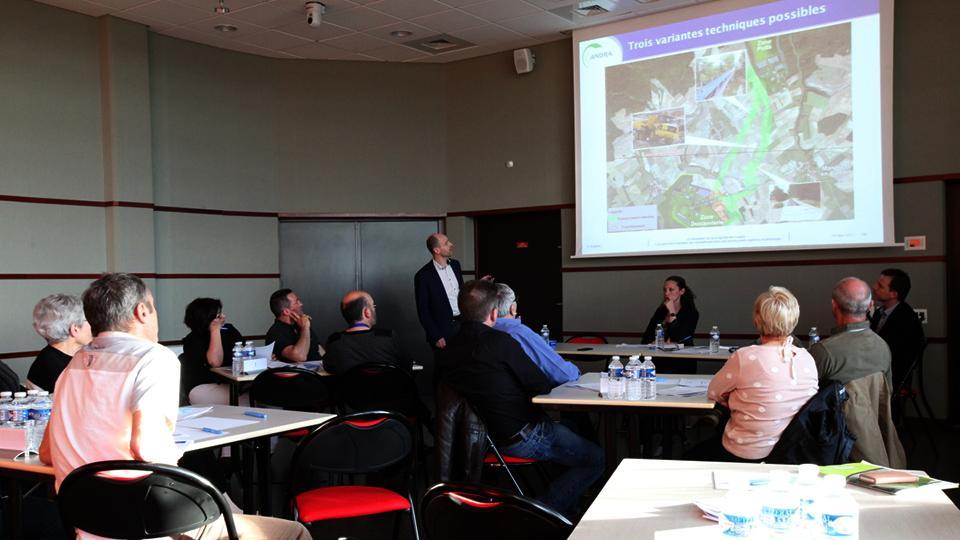A center for more than a century
The management of long-lived radioactive waste involves long timescales: the center will operate for more than a century and will ensure the protection of humans and the environment over hundreds of thousands of years.
During the whole of its operation, Cigeo will be reversible and its future governance is being constructed in conjunction with society. The involvement of society and the democratic process have always been at the heat of the project, with 3 acts and 2 public debates. Andra wishes to continue the involvement of local residents and citizens. That is why it is implementing a long term process of dialogue and consultation.
After it is closed, the repository must remain safe even if it is forgotten. However, Andra is designing Cigeo with the aim of preserving the memory and transmitting it to future generations for the longest time possible.
Governance of Cigeo and reversibility
Cigeo will be in operation for over a century, during which time the packages will be disposed of in the repository as they arrive at the center. Because of the length of this period of operation, not all the facilities will be built from the beginning. Following an initial construction phase, they will be rolled out gradually, as the waste is disposed of. This will contribute to the reversibility of the disposal facility and assist with the integration of any improvements made possible by scientific and technological progress and experience feedback.
Reversibility
The ethical concern for reversibility comes from the time scale required for managing the most harmful radioactive waste. In particular, given the period of operation of Cigeo (more than a century), our generation has a responsibility to design and pass on to future generations a safe facility, which they are able to modify or improve depending on their own objectives and constraints, or indeed replace with other management facilities, if other options become available, in particular due to technical progress.
The Act of 25 July 2016: reversibility and Operations Master Plan
“Reversibility is the ability of successive generations to either pursue construction then operation of consecutive phases of a repository, or to reassess earlier decisions and modify management solutions”.
The Act stipulates that “to ensure citizen participation throughout the operating life of a deep geological repository, Andra shall draw up an Operations Master Plan (PDE) for the facility, and update it every five years in collaboration with all stakeholders and the public."
Retrievability, a tool of reversibility
From the design phase of Cigeo, technical measures have been included to facilitate the possible retrieval of waste packages during the entire period of operation of Cigeo (linings to limit cell deformation, robots for retrieving packages, sensors to monitor changes, testing, etc.), should future generations decide to retrieve them.
A project constructed with society
Cigeo’s size and the ethical issues it raises make it a project of general interest to both current and future generations. For this reason Andra has chosen to pursue an approach of openness to society and has been innovative in terms of public dialogue and consultation, making the issue of radioactive waste management exemplary in terms of environmental democracy.
The Cigeo project is the outcome of a lengthy democratic process involving the passing of three laws (in 1991, 2006 and 2016) and the holding of two national public debates, with the result that solutions have been found collectively for managing the most hazardous radioactive waste.
In 2005 the first national public debate was held on the basis of the first fifteen years of research. Public meetings revealed the need to make an ethical and social choice between two options for managing HLW and ILW‑LL: storage and geological disposal. It is the ASN’s view that “deep geological disposal is the only permanent disposal solution possible”.
On the basis of this debate and the assessments carried out, in 2006 the French parliament opted for deep geological disposal but laid down a requirement of reversibility for at least 100 years.
In 2013 a second national public debate was held on the Cigeo project. Because of the difficulty of holding public meetings, the debate was held on the internet, with more than 76,000 visits, 1500 questions and 500 opinions. A “citizens’ conference” was also held for the first time as part of a public debate.
As part of the follow-up to the public debate, in response to the opinions and expectations expressed, Andra decided to make changes to the Cigeo project, particularly by including an industrial pilot phase at the start-up of the facility and encouraging greater public involvement with the creation of an Ethics and Society Committee.
In 2016 the French parliament passed a third law (the Act of 25 July 2016) on the terms of construction of Cigeo and its reversibility.
An ambitious consultation process
Following on from the dialogue the consultation actions it has been conducting since the public debate in 2013 and at a time when the Cigeo project is entering an increasingly tangible phase, Andra has decided to launch an ambitious approach to involve civil society. To support this initiative, it is assisted by two guarantors appointed by the French National Public Debate Commission (CNDP), at Andra's request.


